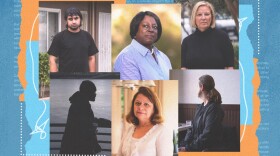After six straw polls, the U.N. Security Council has endorsed a candidate for secretary-general: Portuguese politician Antonio Guterres.
"Guterres is well known in the U.N. system," as NPR's Michele Kelemen tells our Newscast unit. Until late 2015, Guterres served as the U.N. high commissioner for refugees, where he led worldwide efforts to help refugees for 10 years.
The Security Council ultimately came together on this pick after a process that was sometimes controversial. "At a time when the Security Council is divided, it was surprising to see all the ambassadors stand together as Russia's Vitaly Churkin, this month's president, announced the news," Michele says.
Guterres was not everyone's first pick, for different reasons. "Some activists had been campaigning to get a woman at the helm of the U.N.," Michele says. As she has reported, half of the candidates were women, including "a Bulgarian who heads the U.N.'s cultural organization, Argentina's foreign minister, a New Zealander who runs the U.N.'s development program and a Costa Rican woman who led successful international climate negotiations." Bulgarian economist Kristalina Georgieva was a latecomer to the race.
At the same time, Russia has been advocating that it is Eastern Europe's turn to hold the position. As the Associated Press explains, "By tradition, the job of secretary-general has rotated among regions," and an Eastern European person has never held the post.
Also, Michele reports that activists had pushed for a more transparent process that would involve countries beyond the 15 members of the Security Council.
However, Guterres ultimately came out ahead in every Security Council straw poll, as Michele reports.
The Security Council's pick is expected to be approved by the General Assembly. Guterres would replace Ban Ki-moon, who will wrap up his second five-year term at the end of the year.
Guterres, who has also served as Portugal's prime minister, spoke with Morning Edition as he was finishing his role as head of the U.N. refugee agency late last year.
During that conversation, he reflected on a world that has changed — that "has lost a lot of its capacity to prevent conflicts and to timely solve them, and the humanitarian consequences of that are catastrophic."
As Guterres put it, "We live in a world now where people that start conflicts or terrorize their own populations ... believe that they can get out of it without any problem. So obviously, with power relations that are less clear, the rules of the game become also less clear, and things just happen in a way nobody predicts."
In that landscape, he is expected to be approved as the world's top diplomat.
Hear the full Morning Edition interview here:
Copyright 2016 NPR. To see more, visit http://www.npr.org/.






